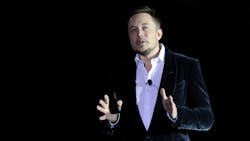Elon Musk: Is Arrogance a Success Factor?
Tesla Motors CEO Elon Musk is making headlines, most of which point to his bold leadership decisions.
Musk is moving his electronic motor patents to a shareware format. While most investors are running away from solar energy, he is doubling down. And he made the controversial decision to give consumers leasing options for Tesla cars and guarantee their trade-in value.
We are in an economic climate where CEO confidence is improving (based on reports from The Conference Board and PwC), yet it is still far from robust. In this environment, is Elon Musk too bold?
Some news coverage proclaims Musk one of the boldest and most innovative chief executives in the world, while others accuse him of being recklessly arrogant.
The question is: what is the distinction between being bold and innovative and arrogant and self-aggrandizing?
At their best, bold CEOS are perceived as assertive, energetic, aggressive, ambitious and visionary. At their worst, they are seen as testing limits, setting unrealistic goals and self-absorbed. When all is going well an executive is more likely to be described in the best terms and vice versa.
But this is perception.
Is there any evidence that arrogance and overconfidence are detrimental to company performance?
In a 2010 National Bureau of Economic Research paper, “CEO Overconfidence and Innovation,” the authors sought to answer this question, especially in regards to a firm’s innovative performance.
Their results suggest that overconfident CEOs are indeed more likely to take their firms in new technological directions. In other words, even overconfidence can contribute to CEO success.
But when is overconfidence and bold behavior too much?
Being Bold
Left unchecked, “being bold” can lead to damaging behavior, with consequences for employees and entire companies.
Characteristics to watch out for are CEOs excessively preoccupied with their own adequacy and constantly involved in struggles for power and prestige.
- They project overblown self-confidence and self-esteem when in fact they are fragile in both regards.
- They promote their own self-worth and superiority by attacking that in others. They lack modesty about themselves and empathy for others.
The distinction is delivering outsized performance for self-centered attention-seeking reasons, or delivering bold moves for the sake of the business and vision.
To me, it comes down to the relationship between courage, confidence and competence -- three critical attributes for CEOs.
Two of the behaviors, courage and confidence, are internalized standards of performance. The other, competence, is in the business domain of abilities and technical skills. All three are integrated.
Elon Musk has demonstrated courage and confidence by sharing his patents. This same move, I believe, displayed his competence – he knows that the only way to quickly grow the market for environmentally-sound vehicles is to encourage others to invest in the same game. This move may cost him market share but it will increase Tesla’s business and import.
In addition, he seems to believe that the sharing of patents will have a positive impact on the world. His motives seem to be much larger than being about his self-worth.
In all likelihood, we will continue to read about Elon Musk, and we may hear that he is confident or arrogant, courageous or high-risk-taking, or visionary or ungrounded in reality.
What we can count on is that he will continue to be bold. If he roots his confidence in competence and a concern for the greater good, he will continue to be successful.
Richard Metheny is leader of the Solutions for Exceptional Leadership practice for the executive search firm Witt/Kieffer.
